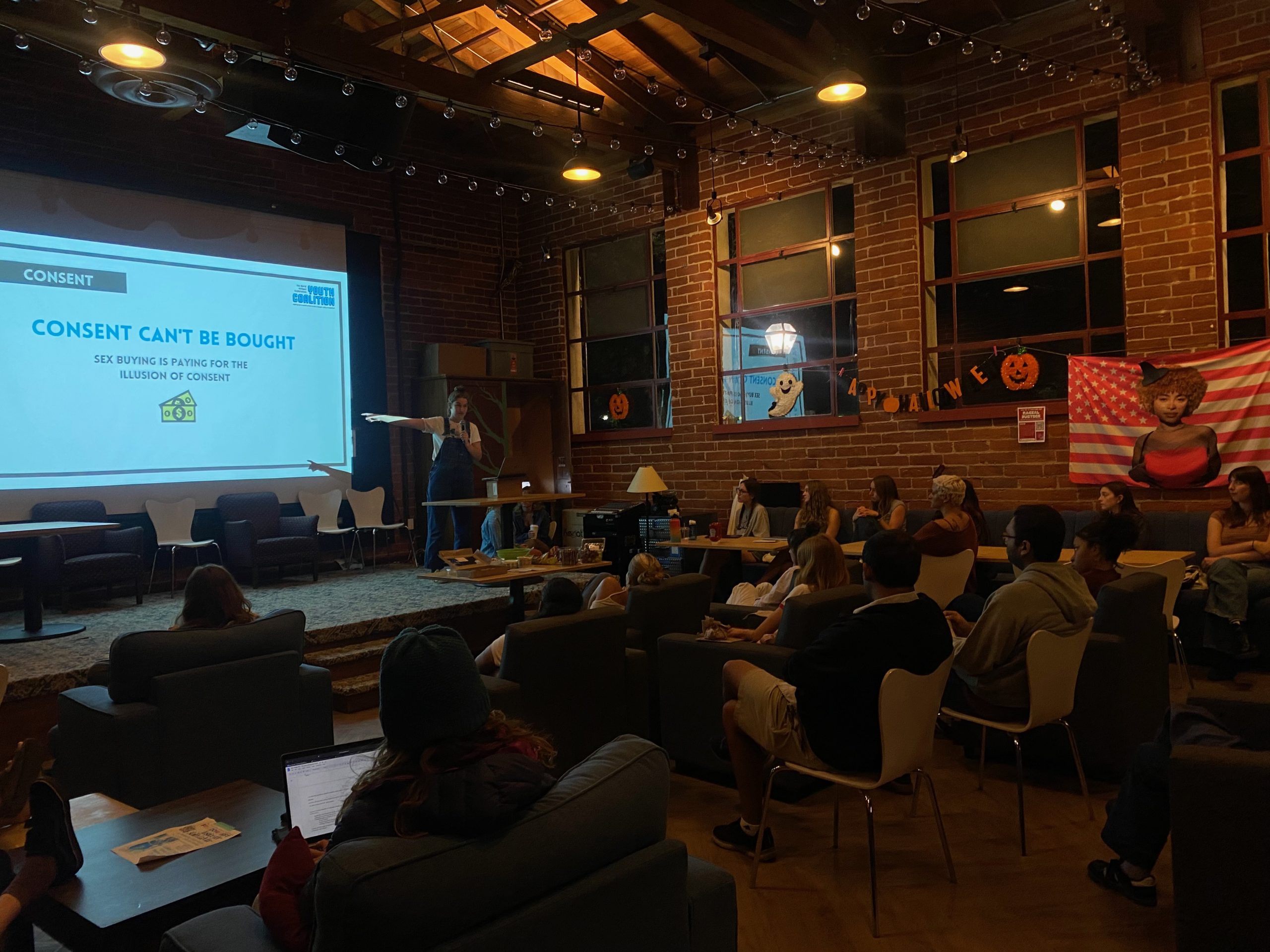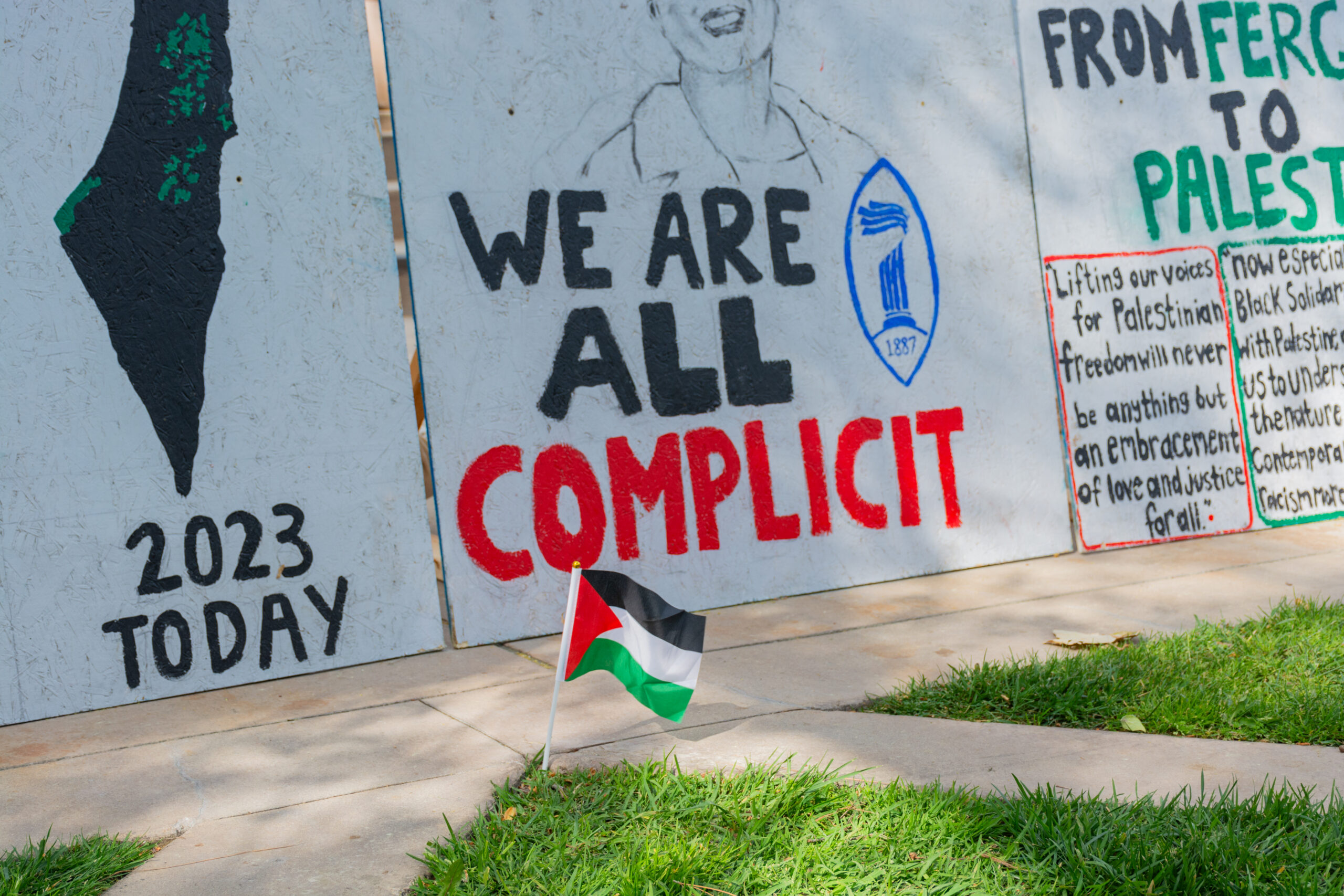
October 7, 2023
“[The term] 'sex work' sanitizes and glamorizes the inherent harms of the sex trade and invalidates the violent and traumatic experience of most people in the sex trade.”

On Sept. 19, the World Without Exploitation Youth Coalition (WorldWE) held their first meeting of the semester at The Hive at Pomona College. Members Dahlia Locke PO ’25, Nayla Dayal SC ’25 and Eloísa Tirres PO ’25 led the Sex Trade 101 presentation. WorldWE is a national non-profit organization that seeks to combat sexual exploitation and promote prostitution abolition. In 2022, the organization established a student-run chapter at the 5Cs.
Read also: Esperanza Fonseca and the Case for Prostitution Abolition (Jan. 31, 2023)
After offering a brief content warning, Tirres began with a fleshed out description of the sex trade, trafficking and the terminology that WorldWE employs when discussing issues of commercial sexual exploitation (CSE). In covering this material, Tirres explained WorldWE’s rejection of the term “sex work.”
“[The term] “sex work” sanitizes and glamorizes the inherent harms of the sex trade and invalidates the violent and traumatic experience of most people in the sex trade,” Tirres said.
Following this introduction, Locke illustrated how marginalized groups in society are often targeted and made susceptible to entering the sex trade. In doing so, she argued that the sex trade was a site for sexism, racism, homophobia, transphobia and classism.
To evidence this, Locke offered the example of Germany, a country that has adopted legalization of prostitution. Apart from the existing CSE of Germans, she asserts that individuals of Bulgarian, Romanian, Hungarian, Ukrainian and Nigerian nationality constitute the majority of people in forced sexual exploitation in Germany.
Locke pointed out that these countries have considerably lower GDPs in comparison to Germany — so these people were likely trafficked into the country with false promises of financial stability to meet the heightened demand for commercialized sex in Germany.
In addition, she maintained individuals who identify as women, queer and/or people of color are disproportionately bought and sold in the sex trade.
Locke commented on the importance of addressing intersectional and marginalized identities in the discourse around sex trade abolition.
You can’t have a serious discussion about the sex trade if you’re not talking about race, sexuality, gender identity, socio-economic status, nationality.
Dahlia Locke PO ’25
“You can’t have a serious discussion about the sex trade if you’re not talking about race, sexuality, gender identity, socio-economic status, nationality,” Locke said. “It’s all relevant.”
Dayal then concluded the presentation with a comprehensive overview of legal frameworks for prostitution. In doing so, she explained WorldWE’s support of the Equality Model.
This framework seeks to asymmetrically decriminalize the sex trade for prostitute people, while maintaining accountability for sex-buyers, pimps and brothel owners.
Dayal addressed the concept of accountability within the sex trade abolitionist movement.
Holding exploiters accountable does not necessarily mean that it has to go through the carceral system.
Nayla Dayal SC ’25
“Holding exploiters accountable does not necessarily mean that it has to go through the carceral system,” Dayal said. “There are sex buyer accountability programs that work in rehabilitation that don’t involve imprisonment.”
Unlike full decriminalization or legalization, she also explained that the Equality Model would provide social services and exit strategies for prostituted people. Dayal spoke further on the significance of implementing the Equality Model.
“The Equality Model [decriminalizes] the sex trade so that prostituted people are not subject to being persecuted by the law,” Dayal began. “It looks at prostitution and the sex trade as structural violence.”
While advocates of both sex trade reform and abolition often aknowledge prostitution as a site of structural violence, there is a divergence regarding the discussions around solutions required to combat this violence. Some proponents support a complete decriminalization or legalization model. However, members at WorldWE contend that the Equality Model is the most effective legislation for addressing sexual exploitation and curtailing the increasing demand for paid sex — and especially its impact on the most marginalized and vulnerable in the sex trade.
WorldWE is making significant strides in raising awareness and promoting the abolition of the sex trade and CSE. The coalition continues to collaborate with partner organizations, legal experts, survivors and organizers to advocate for partial decriminalization models both within the United States and across the globe.
Anna Peterson (she/her) serves as the resident policy consultant on World Without Exploitation Youth Coalition’s national branch. She works with survivors of the sex trade, organizers and legal experts on the issue of sex trade abolition. In her free time, she’s also a member of the Claremont Concert Choir and a horror movie fanatic.
WorldWE held a second Sex Trade 101 presentation on Oct. 3 at the Motley at Scripps College. WorldWE intends to organize several more meetings and events over the course of the semester. To keep up to date with WorldWE’s upcoming initiatives, you can follow their Instagram @worldweyouth5C and send them a direct message to join their email list.


Palestine

Palestine

Palestine

Undercurrents reports on labor, Palestine liberation, prison abolition and other community organizing at and around the Claremont Colleges.

Issue 1 / Spring 2023
Setting the Standard
How Pomona workers won a historic $25 minimum wage; a new union in Claremont; Tony Hoang on organizing
Read issue 1